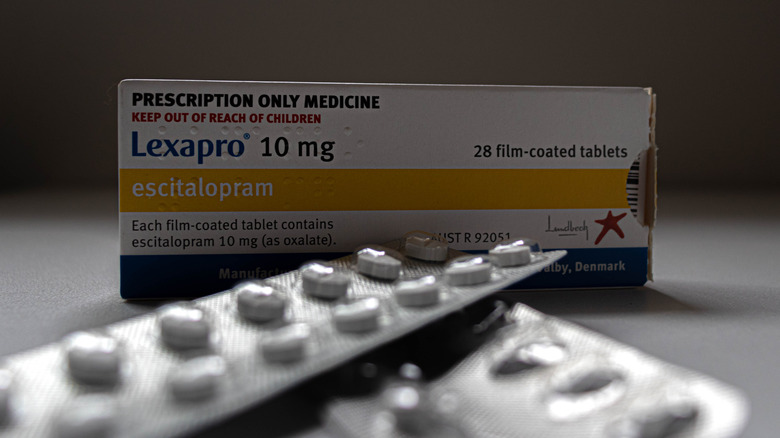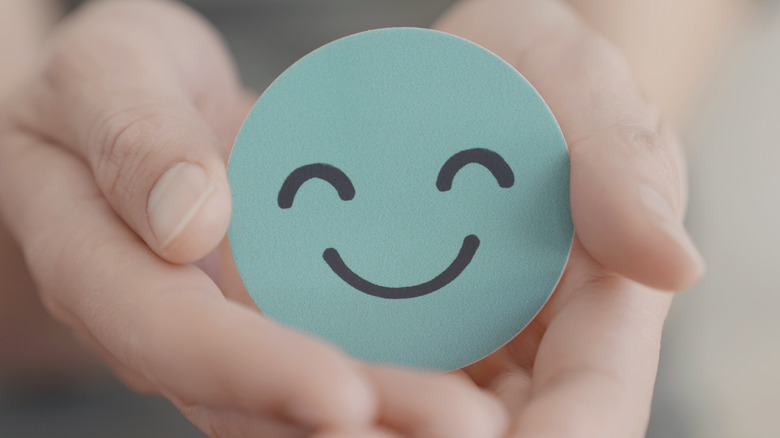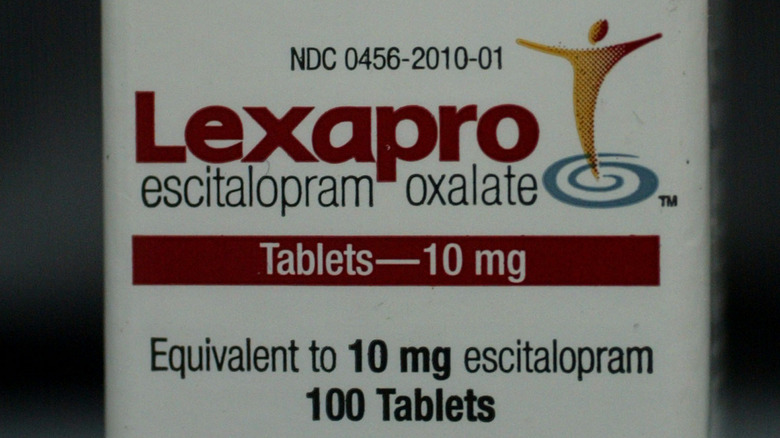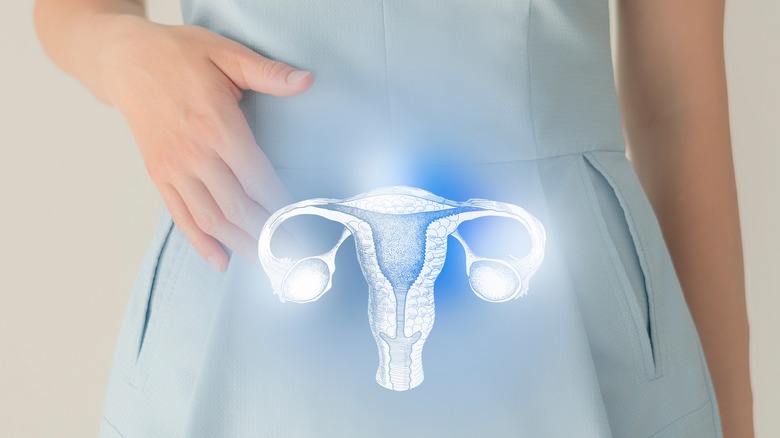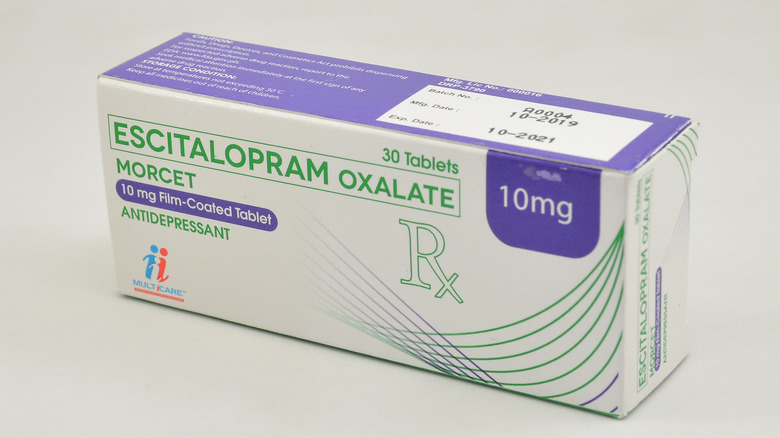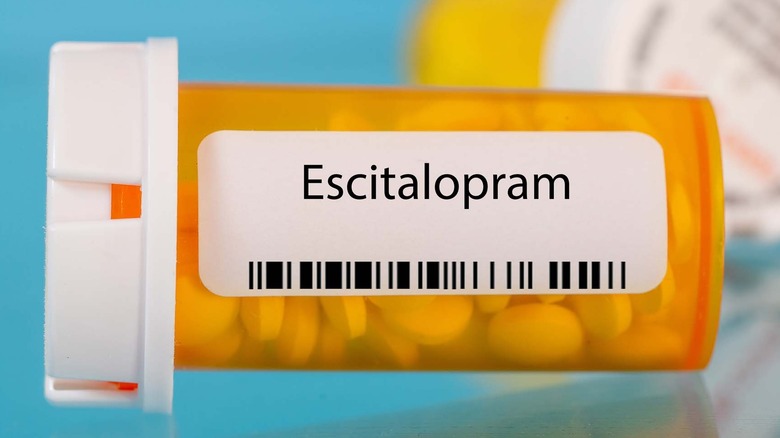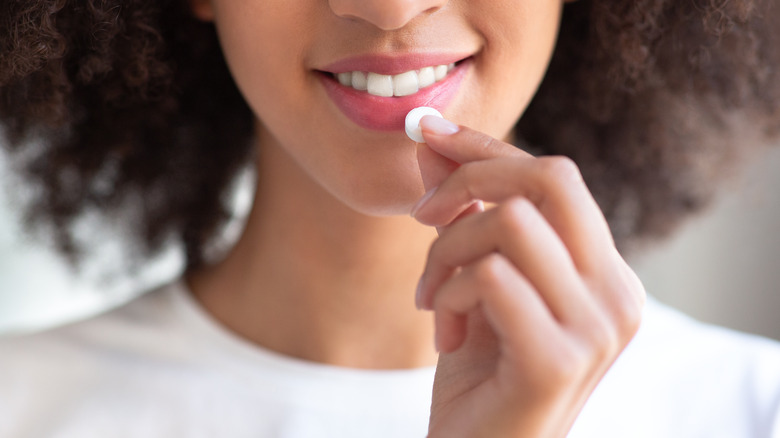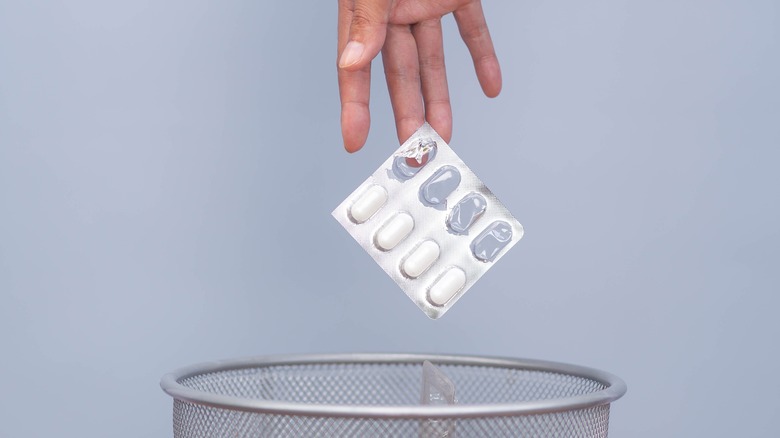Lexapro Explained: Usage, Dosage, And Side Effects
Lexapro is the brand name for escitalopram, an antidepressant approved for the treatment of major depressive disorder (MDD) and generalized anxiety disorder (GAD). It's also used "off-label" to treat several other mental health conditions. Escitalopram is chemically very similar to another popular antidepressant, citalopram (Celexa). Two pharmaceutical companies — Forest Laboratories in the United States and Lundbeck in the Netherlands — developed escitalopram between 1997 and 2001. In 2002, the Food and Drug Administration (FDA) approved escitalopram for use in treating MDD, and the next year, it was approved for treating GAD. Today, escitalopram is sold as Lexapro by Forest Laboratories in the United States and as Lexaprin, Cipralex, Sipralexa, Entact, and Seroplex by Lundbeck elsewhere around the world (via Bionity). In 2012, the FDA approved the first generic version of Lexapro (via WebMD).
Despite its short history, escitalopram is now one of the most widely prescribed drugs in the United States. According to Clincalc, as of 2019, it ranked 19th among all prescription medications in the United States. More than 27 million prescriptions for escitalopram are written every year for over 6 million Americans. Fortunately, escitalopram is covered by most health insurances, so the average out-of-pocket cost to fill a prescription is less than $8.
While Lexapro can be a game-changer for many individuals with depression or anxiety, taking it comes with certain risks. Moreover, it's not for everyone. It's important to follow dosing instructions carefully and to wean off the medication slowly to avoid unpleasant withdrawal symptoms.
The role of serotonin in depression and anxiety
To better understand how Lexapro works, you first need to know a bit about serotonin and its effects on mental health. As the Cleveland Clinic explains, serotonin is a molecule that acts both as a neurotransmitter and as a hormone. It's made by our bodies from the amino acid tryptophan. In its role as a neurotransmitter, it carries chemical messages from the brain throughout the body. Serotonin impacts mood, memory, and learning, but it also plays roles in regulating body temperature, sexual arousal, sleep, hunger and digestion, wound healing, and bone density. While we often think of serotonin as a "brain chemical," a whopping 90% of the serotonin in our bodies is found in the cells lining our gastrointestinal tract.
According to the Cleveland Clinic, serotonin is "often called your body's natural 'feel good' chemical. When serotonin is at normal levels, you feel more focused, emotionally stable, happier and calmer." Both depression and anxiety are associated with low serotonin levels. Low serotonin is also seen in psychiatric conditions such as PTSD, OCD, phobias, panic disorder, and schizophrenia. Sleep disorders and digestive problems are also associated with low serotonin levels. Some individuals don't produce enough serotonin, while others don't have enough receptors for serotonin or the receptors don't function properly. Certain foods and dietary supplements, sunlight, and exercise may increase serotonin levels in some people. Others, however, may need medications to help bring their serotonin levels into a healthy range.
Lexapro is an SSRI
Escitalopram is a selective serotonin reuptake inhibitor (SSRI). According to the NHS, SSRIs are the medication of choice for treating depression, and are also used to address a variety of other mental health conditions. After serotonin delivers its chemical message, nerve cells usually reabsorb (reuptake) it. But SSRIs block this process, which means serotonin molecules are able to remain "alive" and active for longer. This creates an overall rise in the amount of circulating serotonin, which often relieves symptoms associated with depression and can make other treatments such as therapy more effective.
Escitalopram isn't the only SSRI. The Food and Drug Administration (FDA) has approved six other medications in this class: citalopram (Celexa), fluoxetine (Prozac), paroxetine (Paxil), sertraline (Zoloft), fluvoxamine (Luvox), and vilazodone (Viibryd). However, according to a 2018 meta-analysis published in The Lancet, escitalopram appears to be one of the most effective medications for treating depression. The researchers reviewed over 500 previously published studies that involved more than 115,000 adults with moderate depression. They compared the effectiveness of 21 antidepressants (across various drug classes) with a placebo or each other. Escitalopram, along with the SSRIs paroxetine and sertraline and two other antidepressants in a different drug class, was found to be most effective and the most likely for patients to stick with.
An earlier study, published in 2014 in International Clinical Psychopharmacology, highlighted evidence suggesting "the overall superior efficacy of escitalopram compared with paroxetine and sertraline as well as other SSRIs."
Lexapro could help with panic disorder
Although Lexapro is approved to treat depression and anxiety, it's often used "off-label" for several other mental health conditions. While taking a drug to treat a condition it hasn't been approved to treat may sound sketchy, it's actually very common in the pharmaceutical world. As the Food and Drug Administration (FDA) explains, "once the FDA approves a drug, healthcare providers generally may prescribe the drug for an unapproved use when they judge that it is medically appropriate for their patient." A doctor may prescribe a drug off-label to treat a condition because there are no approved drugs for that condition, or because a patient has tried other approved treatments that haven't worked. Sometimes, off-label use involves giving the drug in a different way or at a different dose.
Escitalopram is prescribed off-label to treat panic disorder (via the National Alliance on Mental Illness). According to the National Institute of Mental Health, panic disorder is "characterized by unexpected and repeated episodes of intense fear accompanied by physical symptoms that may include chest pain, heart palpitations, shortness of breath, dizziness, or abdominal distress." These episodes aren't associated with a specific trigger or stressor. A 2007 paper published in Neuropsychiatric Disease and Treatment concluded that escitalopram showed "great value" in treating panic disorder. The authors noted that while there hadn't been many clinical trials of escitalopram to treat panic disorder, there had been studies showing that citalopram (which is chemically very similar to escitalopram) was effective.
Lexapro may help with OCD
According to the International OCD Foundation, Lexapro, along with the other SSRI antidepressants, is used off-label to treat obsessive-compulsive disorder (OCD). Other types of antidepressants, however, appear to have little or no impact on OCD. Not only can escitalopram reduce the symptoms of OCD itself, but it can also address the depression that often accompanies OCD. About 70% of individuals with OCD find medication effective and experience, on average, a 40%–60% reduction in their symptoms. Unfortunately, about half of individuals stop taking medication because of unwanted side effects or for other reasons.
Per the Cleveland Clinic, OCD is a type of anxiety disorder marked by both obsessions (repetitive thoughts, fears, or urgers that cause extreme distress) and compulsions (behaviors, rituals, or routines that the person feels they must do to control the anxiety they feel). But performing the compulsive actions only relieves the anxiety induced by the obsessions temporarily. Common obsessions include fears around germs or causing harm to others, as well as an extreme need for order, symmetry, and neatness. Common compulsions include frequent handwashing, arranging items in a very specific order, repetitive counting, and repeatedly checking things like locks.
Researchers aren't sure what causes OCD, but low serotonin levels, combined with overactivity in certain parts of the brain and certain environmental factors, appears to play a role. In addition to Lexapro and other SSRIs, cognitive behavioral therapy (CBT) may also help individuals better manage their symptoms.
Lexapro may be useful for PMDD
While most menstruating women will at least occasionally have some unpleasant symptoms immediately before their period starts, premenstrual dysmorphic disorder (PMDD) isn't your garden-variety PMS. As Harvard Medical School explains, "some women of childbearing age experience premenstrual symptoms that are so severe they cause significant mental distress and interfere with work, school, or relationships ... PMDD can disrupt a woman's life and relationships so completely, she may even consider suicide."
For a woman to receive a diagnosis of PMDD, she must have at least five of the following symptoms (including at least one related to mood) during most menstrual cycles: depression, anxiety, sudden mood swings, irritability, loss of interest in daily activities, trouble concentrating, low energy, appetite changes, insomnia, and physical symptoms such as bloating or breast tenderness. Moreover, these symptoms must be so severe that they interfere with daily activities, relationships, work, or school.
Although doctors don't know exactly what causes PMDD, antidepressants that increase serotonin levels, particularly SSRIs like Lexapro, are often an effective treatment. Because escitalopram works faster for PMDD than it does for depression, many woman can get relief by taking the medication only during the second half of their menstrual cycle, a technique known as luteal-phase dosing. This intermittent use of escitalopram appears to be sufficient to address PMDD symptoms related to mood, but women may need to take the medication continuously to get relief from symptoms such as fatigue and physical discomfort.
Lexapro can help alleviate PTSD
While it's often associated with veterans, post-traumatic stress disorder (PTSD) can affect anyone who experiences or witnesses a traumatic event. As the Mayo Clinic explains, these can include physical assault, sexual violence, childhood abuse, and major accidents. PTSD symptoms may start as soon as a month after the traumatic event or may not emerge until years later. The Mayo Clinic notes that "PTSD symptoms are generally grouped into four types: intrusive memories, avoidance, negative changes in thinking and mood, and changes in physical and emotional reactions."
According to the American Psychological Association, SSRIs are the medication of choice when treating PTSD. But only two SSRIs, sertraline (Zoloft) and paroxetine (Paxil), have been officially approved by the Food and Drug Administration (FDA) to treat PTSD. Escitalopram, however, is often prescribed off-label to manage PTSD symptoms (via the National Alliance on Mental Illness). A 2019 study published in the Journal of Clinical Psychopharmacology found that high doses of escitalopram — up to 40 milligrams per day — were effective at relieving PSTD symptoms in most study participants, and the drug was generally well tolerated with few side effects. Both before and after the study, the researchers rated participants using the Clinician Administered PTSD Scale (CAPS), which gauges the severity of an individual's PTSD symptoms. They found that participants' CAPS scores dropped an average of 16%.
You may be able to control binge-eating disorder with Lexapro
The Agency for Healthcare Research and Quality defines binge-eating disorder (BED) as "a condition in which a person often eats a much larger amount of food at one time than is normal," with the loss of self-control while doing so. To receive a BED diagnosis, a person must binge eat at least once a week for a minimum of three months. To qualify as a binge episode, at least three of these criteria must be met: eating much faster than normal, eating large amounts of food when not hungry, eating until uncomfortably full, eating alone because of embarrassment, and experiencing feelings of guilt, disgust, or depression afterward. BED is the most common eating disorder, affecting approximately 3% of women and 2% of men in America. It can lead to serious health concerns, such as obesity, digestive issues, sleep problems, menstrual irregularities, and depression.
In addition to therapy, many find that medications are also helpful. While lisdexamfetamine (Vyvanse) is the only drug approved by the Food and Drug Administration (FDA) to treat BED, other medications, including topiramate (Topamax) and the so-called "second-generation" antidepressants have also been successful. In addition to escitalopram and other SSRIs, these second-generation antidepressants include bupropion (Wellbutrin) and duloxetine (Cymbalta). Escitalopram and the other antidepressants have been shown to help individuals stop binge eating or binge eat less often, as well as reducing eating-related thoughts and urges. Escitalopram does not, however, directly help individuals lose weight.
How much Lexapro should you take?
According to Medscape, Lexapro comes in either tablet or liquid form. Tablets may be 5, 10, or 20 milligrams each, and the liquid version contains 5 milligrams of escitalopram per 5 milliliters of liquid. Doctors determine dosage based on a person's symptoms, age, weight, and other medical conditions. In general, however, they start with the lowest dose they believe will be effective and will only increase the dose if an individual isn't getting relief from their symptoms. For depression, anxiety, or obsessive-compulsive disorder (OCD) in adults, the recommended dose is 10 milligrams once daily, which can be increased to 20 milligrams once daily if needed. While 20 mg is the usual dosage cap for escitalopram, Bionity notes that doctors may prescribe up to 40 milligrams a day for some adult patients. The elderly should take no more than 10 milligrams daily.
Per WebMD, the dose for children may be less than for adults. Additionally, there is a need for more research on the long-term effects of this drug on children. When using the liquid form of escitalopram, you should shake the bottle well prior to measuring out each dose. Escitalopram can be taken with or without food, and while you can generally take it any time of day, your doctor may provide more specific instructions. It should be stored in a dry place at room temperature, away from direct light or heat.
Side effects of Lexapro
Although escitalopram has helped millions of Americans with depression, anxiety, and other mental health conditions, like all drugs, it comes with the possibility of side effects.
According to RxList, common side effects of escitalopram include drowsiness, insomnia, nausea and upset stomach, gas, constipation, heartburn, dry mouth, ringing in the ears (tinnitus), and dizziness. It may also cause a change in weight. Men may experience difficulty achieving and maintaining an erection, and both men and women can have difficulty reaching orgasm. On rare occasions, escitalopram may cause more serious side effects, such as abdominal pain or bleeding, blurred or tunnel vision, eye pain or swelling, chest pain, abnormal heartbeat, tremors, loss of coordination, severe headache, and muscle weakness or rigidity. Serious psychological side effects of escitalopram include racing thoughts, confusion, increased risk-taking behavior, and extreme mood changes. It's also possible to have an allergic reaction to escitalopram.
A 2009 study published in Psychiatry examined which side effects were most commonly reported by patients taking SSRIs, including escitalopram. The researchers found that 38% of participants experienced at least one side effect. The most commonly reported side effects were sexual dysfunction, drowsiness, and weight gain. Dry mouth, insomnia, fatigue, nausea, dizziness, and tremors rounded out the list of most commonly reported symptoms. Of those who experienced side effects, 5% rated them "not at all bothersome," while 69% rated them "a little bothersome" or "somewhat bothersome." Another 26% rated their side effects "very bothersome" or "extremely bothersome."
Can Lexapro lead to suicidal thoughts and actions?
Although rare, antidepressants may increase the risk for suicidal thoughts or behaviors in some individuals. Escitalopram is no exception and, because of this, the Food and Drug Administration (FDA) requires Lexapro packaging to include a black box warning alerting health care professionals and consumers to this potential risk (via Drugwatch).
As the National Center for Health Research explains, "[W]hen people feel less helpless but still feel depressed, they may think about suicide as a way out, whereas before they were too immobilized to make a suicide plan." But evidence suggests that even individuals taking antidepressants for some other mental health concern, such as anxiety or obsessive-compulsive disorder (OCD), are at increased risk for suicide. The risk of suicide while on antidepressants appears to be greatest among children, adolescents, and young adults up to age 25. These individuals may be up to twice as likely to contemplate or attempt suicide compared to their peers who aren't taking antidepressants.
Research on risk among older adults has been mixed, although the studies that did find an increased risk of suicide among older adults listed other antidepressants — mirtazapine, venlafaxine, or trazodone — as the culprits, not escitalopram. Antidepressant use among teens also appears to increase the risk of violent behavior, although only sertraline (Zoloft) has been directly linked to this issue so far.
If you or anyone you know is having suicidal thoughts, please call the National Suicide Prevention Lifeline by dialing 988 or by calling 1-800-273-TALK (8255).
Lexapro may cause serotonin syndrome
Taking escitalopram can lead to a potentially life-threatening condition known as serotonin syndrome. While having high levels of this "feel good" neurotransmitter circulating through your system sounds like it would be a good thing, serotonin syndrome can be serious and even deadly (via the Mayo Clinic).
Serotonin syndrome can occur when you begin taking escitalopram or any other serotonin-boosting medication, increase your dosage, or, as is most often the case, take multiple serotonin-boosting substances at the same time. These include other classes of antidepressants, including serotonin and norepinephrine reuptake inhibitors (SNRIs), tricyclics, monoamine oxidase inhibitors (MAOIs), and bupropion. Medications used to prevent or treat migraines, lithium (used to treat bipolar disorder), prescription opioid pain relievers, over-the-counter cold medications containing dextromethorphan, certain anti-nausea medications, and linezolid (an antibiotic) can all interact with escitalopram and cause serotonin syndrome. Not surprisingly, many street drugs can also cause serotonin syndrome when combined with escitalopram, including MDMA, cocaine, and amphetamines. Even nutmeg and the herbal supplements St. John's wort and ginseng may increase serotonin to dangerous levels when combined with escitalopram.
Symptoms of serotonin syndrome include agitation, insomnia, rapid heart rate, elevated blood pressure, muscle twitching or rigidity, profuse sweating, headache, diarrhea, and shivering. Severe symptoms include high fever, tremor, seizures, irregular heartbeat, unconsciousness, and death. Fortunately, symptoms usually resolve within a few days of stopping medication use, although in severe cases, individuals may need drugs that block the production of serotonin, as well as supportive treatments like oxygen.
Who shouldn't take Lexapro?
Although escitalopram is generally well tolerated and has helped millions of people effectively manage their depression, it isn't a good fit for everyone.
As WebMD explains, there are a variety of health conditions that are contraindicated for escitalopram (in other words, conditions that suggest escitalopram shouldn't be used at all or should be used only with extreme caution and close doctor supervision). Individuals with low levels of sodium, potassium, or magnesium in their blood should not use escitalopram. People at an increased risk of bleeding, those with certain heart arrhythmias, and those who've had a heart attack in the last month should also not use this medication. Escitalopram should not be taken by anyone with closed-angle glaucoma, end-stage kidney disease, or certain liver problems. While escitalopram can be very effective at treating depression, it should not be taken by anyone who has manic-depression (bipolar disorder) or experiences episodes of mania (abnormally elevated mood). Certain genes are implicated in how well an individual will respond to a particular antidepressant, and for escitalopram, those with certain mutations on the CYP2C19 gene should not use this medication because they may metabolize it too quickly or not metabolize it well.
For those who are pregnant or breastfeeding, the benefits of taking escitalopram must be weighed against the potential risks. According to Mother to Baby, escitalopram may slightly increase the risk of miscarriage and certain pregnancy complications, and small amounts of this antidepressant are expressed in breast milk.
How long does it take Lexapro to start working, and what if it's ineffective?
Although escitalopram works for many people, it doesn't reduce depression symptoms overnight. As the National Alliance on Mental Illness explains, "sleep, energy, or appetite may show some improvement within the first 1–2 weeks," but "depressed mood and lack of interest in activities may need up to 6–8 weeks to fully improve."
While you'll need to wait a few months to know for sure whether escitalopram (or any antidepressant) is working for you or not, there are a few warning signs you should be on the lookout for, according to WebMD. If your depression worsens or you experience drastic mood swings, these are red flags you should tell your doctor about. Side effects may also be so serious or bothersome that it's better to explore alternative treatment options. WebMD recommends that if you haven't seen any improvement in 12 weeks, it's time to switch things up.
According to Johns Hopkins Medicine, even if escitalopram initially worked wonders for you, it may become less effective over time. This phenomenon, known as "breakthrough depression," happens to about a third of individuals who regularly take an antidepressant. Triggers for breakthrough depression include drug or alcohol use, pregnancy, and the introduction of new stressors or medications. But in many cases, it's unclear why a particular antidepressant stops working for someone. If breakthrough depression occurs, it may be necessary to increase the dosage or switch to a different antidepressant.
How to safely stop taking Lexapro
If you've been prescribed escitalopram (or any other antidepressant that affects serotonin levels) and you want to stop taking it, you shouldn't simply stop popping the pill every day.
As Harvard Medical School states, improperly coming off an antidepressant can cause some unpleasant withdrawal symptoms and worsen depression. Over time, our neurons adapt to a specific level of serotonin, so if that level drops suddenly, it can cause a variety of withdrawal symptoms that affect many body systems. Digestive withdrawal symptoms include nausea, vomiting, abdominal cramping, loss of appetite, and diarrhea. Individuals may also have difficulty sleeping, feel dizzy or lightheaded, have some difficulty coordinating their movements, experience tremors, or sweat excessively. Withdrawal may also lead to strange sensations known as "brain-zaps," a sensation similar to an electric shock to a person's head. While these symptoms can be unpleasant and unsettling, they are rarely medically dangerous. Withdrawal can also cause psychological symptoms such as mood swings, anxiety, irritability, and confusion.
Escitalopram has a half-life of 27–32 hours, and will be 99% out of your system in 6.1 days. Withdrawal symptoms usually appear within days or weeks of stopping escitalopram, and will go away on their own as the body eventually readjusts. However, to minimize the risk of experiencing these symptoms, it's important to wean off escitalopram by slowly decreasing the dosage over time. Always speak to your doctor before coming off of escitalopram or any other medication.

